What is the difference between ADHD and OCD; when you have ADHD your brain has a low level of a chemical called dopamine
When you have OCD your brain has too much chemical called serotonin. Sometimes people have both ADHD and OCD this means that you are lack attention or hyperactivity of ADHD, along with the compulsion or obsessions of OCD. Both seem to be highly inherited if you are suffering any one of these may be one of your parents has it.
Occasionally people with ADHD tend to have compulsive tendencies; this is because we’ve learned to overreact on problems that we’ve experienced with distraction, disorganization, and inattention. Stimulant medication for ADHD also helps you to stay organized, may also help you to stay focused on your environment. It helps you filter out distractions, such as being surrounded by mounds of papers or being in disordered surroundings. Being organized is not something that came naturally to anyone else; you have to learn how to do it, and still need help in order to maintain organization. When you have OCD, you may have compulsions and/or obsessions.
When you have compulsions, which means you have certain rituals or have a habit to do things in a certain way.
Not being able to follow your certain rituals causes you excessive distress. Continue to focus on that ritual during the day, you can’t stop thinking about it, and you just don’t “feel right” until you can do the ritual again. You never really get relief from that feeling of anxiety. You may also experience having obsessions — images, thoughts or ideas in your head that won’t go away. The more you try to get rid of these thoughts, the more they show up. You may have an uncontainable desire to repeat a word or phrase over and over in your head. Alarming images may pop into your head; images that you just feel like you don’t have control over.
It’s understandable why OCD symptoms can be mistaken for ADHD, the correct diagnosis is vital for the welfare and future trajectory of the patient, not just for the choice of treatment, but also for psychological and behavioral treatment, and awareness and education for families and educators.

